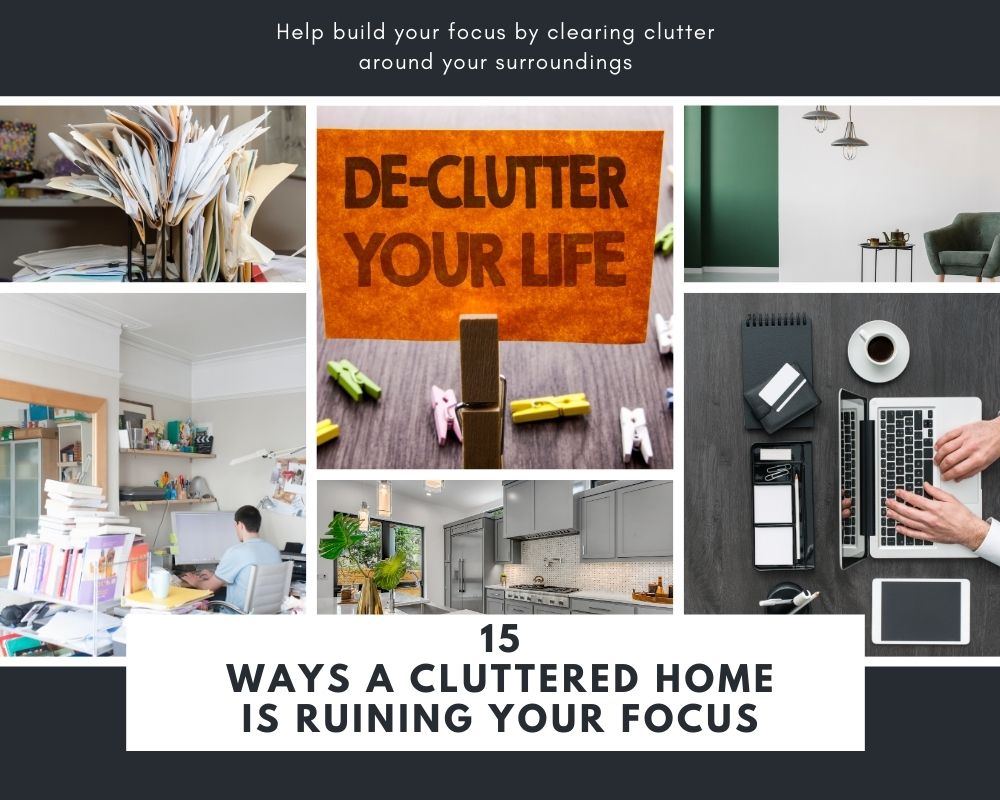A cluttered home is an over-accumulation of stuff that has proven to affect both your mental and physical wellbeing.
Clutter –is an over-accumulation of items that has proven, tangible effects on both your mental and physical well-being. Overall, kicking your clutter habit and cleaning your house will trim down any stress and create a better living environment for you and your family.
Since most of us are still in a work-from-home situation, theLocal Records Office has compiled a guide that is useful on how clutter impacts your lifestyle and shares how you can implement ways to create a more open-flowing environment to better your overall health and environment.
1. Increases Stress – According to a study in the Personality and Social Psychology Bulletin, people who have cluttered homes and have unfinished projects were reported to be more depressed, fatigued, and had higher levels of the stress hormone cortisol than those who had described their homes as “restful” and “restorative”
2. Wrecks Your Diet – A study done in Psychological Science has found that participants in an orderly environment choose healthier snacks than those who live in a cluttered environment.
3. Triggers Respiratory Issues – According to the Alliance for Healthy Homes, cluttered homes that contain more dust, can amplify breathing problems.
While more things pile up, more dust is generated. This creates an ideal living environment for pests such as dust mites.
As the harder it gets to access the space of your home to clean, the more serious these respiratory issues can become.
4. Threatens Your Safety –The Mental Health Association of San Francisco warns homeowners that excessive amounts of clutter –especially cardboard boxes, paper, and clothing –can block the doorways and windows, creating a serious fire hazard.
5. Hurts Relationships – When you share a home the excessive clutter is no longer only a “you” problem. Clutter hurts the lives of your significant other and your kid(s).
6. Jeopardizes Your Love Life –people with a hoarding disorder have difficulty getting rid of things and feel distressed when having to part with their belongings. As this takes a toll on one’s marriage, studies have shown compulsive hoarders have higher rates of divorce.
7. Upsets Your Kids – They can often have elevated levels of distress, experience less happiness, and have more difficulty in making friends.
8. Isolates You – As it affects your desire to invite anyone in, nearly half the surveyed homes in a Rubbermaid survey conducted by Russell Research said they won’t invite friends over if their home is cluttered.
9. Derails Your Career – Messy people rarely confine their tendencies of disorganization in just their homes and can seep into your professional life.
10. Prevents You From Getting Promoted – An untidy briefcase, chaotic desk, or an undefined filing system will have a major impact on your job performance. A CareerBuilder study found that 28% of employers were less likely to promote a person who has a messy workspace.
11. Makes You Miss Work – Researchers from the National Institute of Mental Health have discovered a correlation to compulsive hoarding was associated with an average of 7 work impairment days per month –which is more than those reported by participants with anxiety, mood, and substance use disorders.
12. Decreases Your Productivity – Having a cluttered environment, the chaos inhibits your ability to focus. A study by the Princeton University Neuroscience Institute observed how “multiple stimuli present in the visual field at the same time compete for neural representation.”
13. Drains Your Wallet – By negatively affecting how you manage finances, leading to poor money management and severe debt.
14. Encourages Bad Spending Habits – When you are unable to find something and buy a duplicate.
15. Keeps You in Debt – By making it difficult for you to locate credit card bills and bank statements. Lost bills mean lost payments; suddenly you are also dealing with late fees, higher interest rates, and collection agencies.
Steps to Guide You Into a Clutter-free Lifestyle
Work in reverse: and ask yourself, what would happen if my home burned down and I lost everything? What would I replace as soon as my renter’s or homeowner’s insurance kicks in?
-Think about your possessions and go someplace quiet (outside of your home) where you can think and make your list. Do not get invested in model numbers or specific products –just jot things down as it comes to your mind what things you would purchase a second time around.
Declutter in small, focused bursts: It will take time to let things go, so set yourself up by making a plan and targeting a specific area to clean up and organize. Do one room at a time, or split up each room into 30 minutes at a time, and take 30-minute breaks.
Think of things you use first, and sentimental value second –As it is easy to get attached to things, because you have had them for a long time, or have some special meaning, maybe represent the hard-earned work you have done. When looking for a way to downsize, it is important to separate yourself from those feelings. Ask yourself these questions:
– “What does this item do for me that nothing else does?”
-“Do I have anything else that does this better, or as well?”
-“Does this have sentimental meaning to me?”
And apply these three questions to everything you own.
Four Box Method – Is a modified version of keep/donate/toss into making four boxes: Keep, Sell/Donate, Store, and Trash
- Keep items you use regularly and have space for.
- Sell/ Donate will go to a Goodwill or a Charity –maybe you can make some money on Craigslist or eBay.
- Trash is junk, where important papers should be shredded, broken items you will never repair.
- Store: are boxes of things you cannot part with that do not play a role in your daily life.
